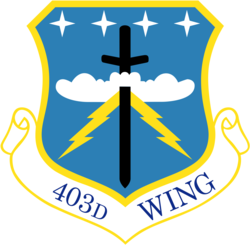403d Troop Carrier Group
| 403d Operations Group | |
|---|---|

Emblem of the parent 403d Wing
|
|
| Active | 1942–1946; 1949–1953; 1953–1959; 1992–present |
| Country | United States |
| Branch | United States Air Force |
The 403d Operations Group (403 OG) is the operational flying component of the United States Air Force Reserve 403d Wing. It is stationed at Keesler Air Force Base, Mississippi.
The 403 OG performs missions including airlift of personnel, equipment and supplies. Additionally, the group is the only unit in the Department of Defense tasked to organize, equip, train and perform all hurricane weather reconnaissance in support of the Department of Commerce.
Trained for overseas troop carrier operations from late 1942 to the summer of 1943, when it moved to the South Pacific.
Transported men and supplies to forward areas in the Solomon Islands and flew passenger and cargo routes to New Zealand, Australia, Fiji, and New Caledonia. The group also moved personnel of Thirteenth Air Force units to the Southwest Pacific theater. Supported campaigns in New Guinea and the Philippines by transporting men and cargo to combat areas, evacuating casualties, and landing or dropping supplies for guerrilla forces. On 23 February 1945, dropped paratroops at Laguna de Bay, Luzon, to free civilian internees held by the Japanese.
Earned a Distinguished Unit Citation for transporting ammunition, food, and other supplies to Eighth Army forces in Mindanao and for landing on jungle airstrips to evacuate wounded personnel from Apr to Jun. From the Philippines, ferried occupation troops to Japan, evacuated liberated prisoners, and flew cargo and passenger routes to Japan and Australia.
From June 1949 until 1 April 1951, when it was called the active duty, the group trained as a reserve troop carrier unit in Oregon.
In Mar and April 1952, moved to Japan for operations against communist forces in Korea. Using C-119s, the group dropped paratroops and supplies, transported personnel and equipment, and evacuated casualties. On 1 January 1953, relieved from active duty and inactivated in Japan.
It activated again as a reserve unit, training for airlift, air evacuation, and aeromedical evacuation missions until inactivation in 1959. From 1992, the group flew Air Force Reserve airlift and weather reconnaissance missions, including Hurricane Hunter missions.
![]() This article incorporates public domain material from the Air Force Historical Research Agency website http://www.afhra.af.mil/.
This article incorporates public domain material from the Air Force Historical Research Agency website http://www.afhra.af.mil/.
...
Wikipedia
